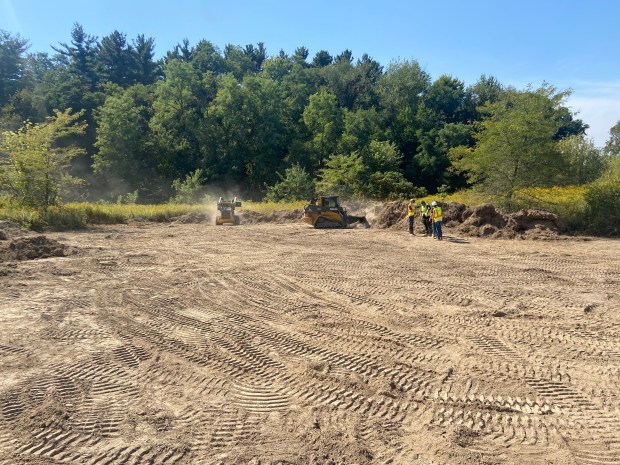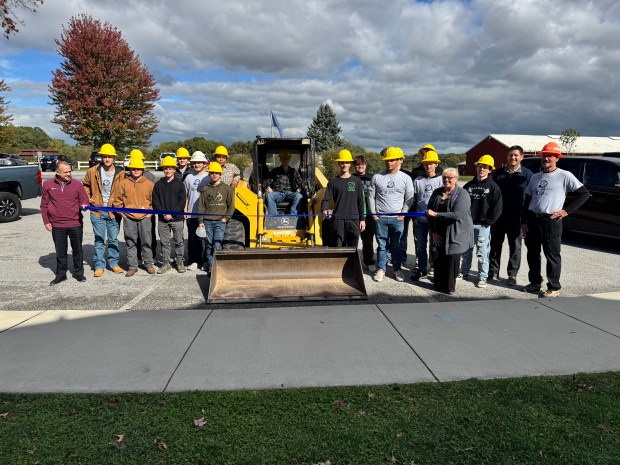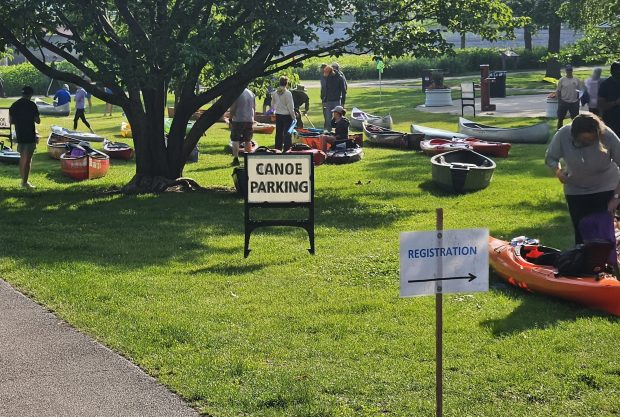High school students in the new civil construction program based at Sunset Hill Farm County Park will not only gain valuable experience but also build lasting features for Porter County parks.
There are 34 students in the program now, with the capacity for 40, split between morning and afternoon sessions, Porter County Career and Technical Education Executive Director Audra Peterson said.
“This is the first time I started with a board as over-the-top supportive as this board has been,” she said Wednesday at a ribbon-cutting ceremony. Rather than have guests slog through mud to see the actual construction zone, the program was held in the program center, where classes are being taught.
“It happened so rapidly,” Peterson said, moving from discussion to implementation in just one year. That included looking at market data to make sure there would be jobs available to the students once they’re trained as well as gaining approval by the Duneland School Board as sponsor. Students from throughout the county can attend.
Peterson expects approval soon for the civil construction classes to be approved as a pre-apprenticeship for the Laborers’ International Union of North America.
CTE programs like this involve partnerships with organizations in that field in the working world. Already, the students have helped with a Superior Construction bridge project to gain experience.

“This is a road map,” Peterson said. “It shows us all what is possible with the power of collaboration.”
Duneland School Corp. Superintendent Chip Pettit was excited about the new program. “In today’s world of public education, it’s a challenge to develop new programs,” he said.
Former Duneland School Board member Ronald “Red” Stone, now a member of the Porter County Council, helped pave the way for the road and bridge construction project to be based at the county park, Pettit said.
Pettit offered a long list of career and technical education programs offered in Porter County. “There just aren’t many parts of the state, parts of the country, that have that available to them,” he said.
Peterson said enrollment in career and technical education programs has soared. “We’ve grown over 500 students in our career and technical education program” in the past four years, she said.
Instructor Kevin Bontrager said students will learn surveying, working with different types of soil, concrete and bridge work. “It all builds on itself,” he said. “It’s not like you become a master concrete without knowing about soils.”
“It couldn’t have come at a more important time,” he said. For the next 15 years, Indiana is investing $1.3 billion a year into roads and bridges, boosting demand for workers in the civil construction industry.
Contractors are working together to support the civil construction classes.
“They’re competitors, but they are trying to figure out the labor issue,” Bontrager said.
Students have two career tracks once they graduate. Some will go on to college, given a boost by up to 18 credit hours through an Ivy Tech Community College dual credit partnership. “A lot of them want to go right into the trades,” Bontrager said.
If they get tired of doing the heavy construction work, they can get an associate degree and train for office jobs in the industry.
Porter County Parks Superintendent Jake McEvoy said this year’s students will help develop Brookdale Park in Liberty Township. “Brookdale is one of those that’s been on our radar for quite some time,” he said.
It’s a fishing lake now, but with few amenities. Soon, it will feature restrooms, a fishing dock, picnic shelters and pathways. The high schoolers will help with the pathways and picnic shelters.
In the future, students could also help build Aukiki County Park, a plot of undeveloped land in south county that has been on the drawing board for years.
“We’ve got all kinds of exciting stuff on the horizon for Porter County parks,” McEvoy said.
Sale of the former Pine Township prison farm gave the parks system a needed funding boost, he said.
State Sen. Ed Charbonneau, R-Valparaiso, was impressed. “This is awesome, and you’re doing it without the government getting involved,” he said.
Doug Ross is a freelance reporter for the Post-Tribune.





